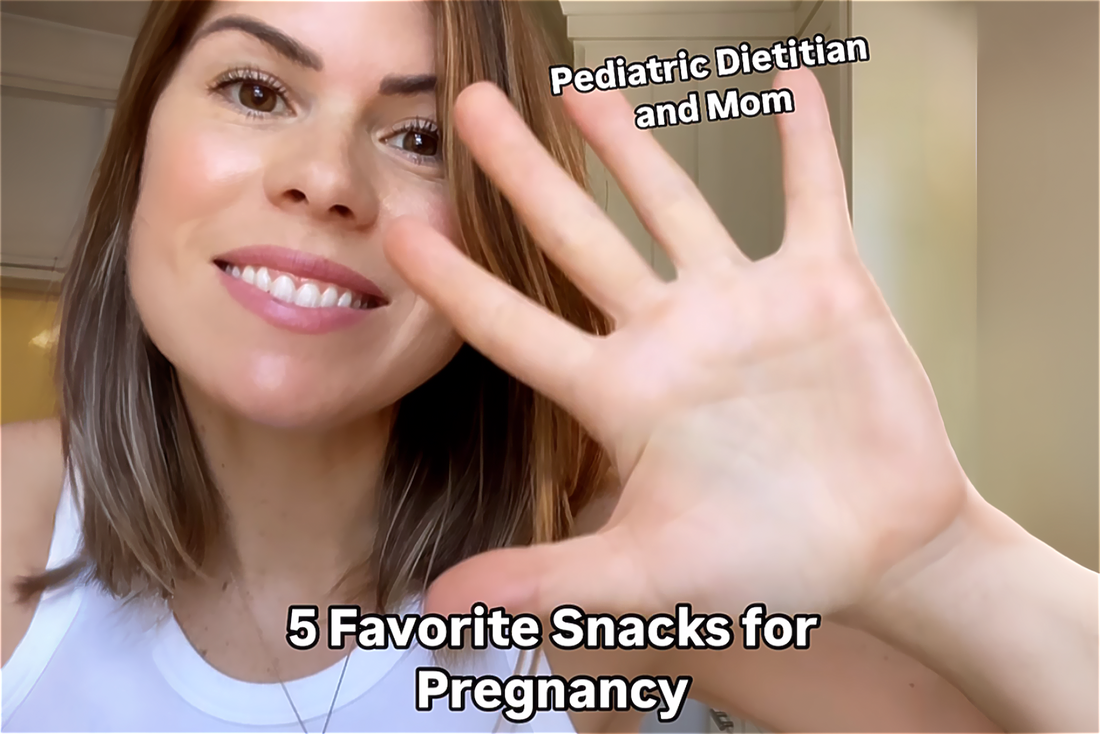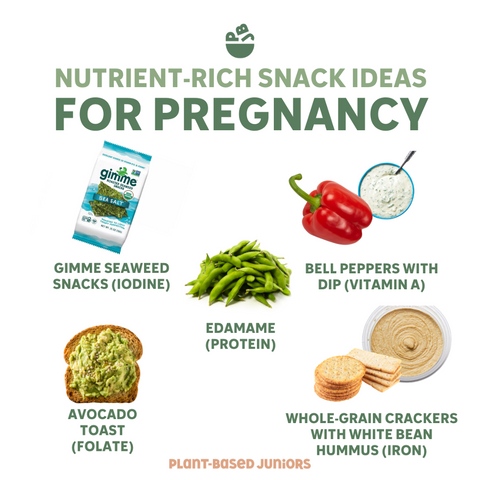As Registered Dietitians, we know diet's critical role in pregnancy. More than just "eating for two," there should be a focus on specific nutrients essential to nourish both mother and baby.
When you are pregnant, you’ll need more nutrition to support your body during this time, and your food choices can help you have a healthy pregnancy while also ensuring your baby is getting all it needs.
These are the nutrients we want to ensure adequate intake for all pregnant women and our favorite food sources!
Vitamin A
The Recommended Daily Allowance, or RDA, for vitamin A during pregnancy is slightly higher: 770 mcg per day of retinol activity equivalents (RAE). Vitamin A is essential during pregnancy because of its role in growth, and studies suggest that low levels (and excessive intake from supplements) can result in adverse effects on the baby.
Plant-based vitamin A-rich foods include sweet potatoes, butternut squash, mango, carrots, and spinach. Try sliced red bell peppers paired with a yummy dip for a vitamin-A-rich snack. A single cup of sliced bell peppers contains 144 mcg RAE.
Iodine
Iodine needs increase almost 50% during pregnancy, from 150 mcg per day for a woman to 220 mcg per day during pregnancy and lactation. Iodine deficiency during pregnancy can cause hypothyroidism in both mom and baby and can impair brain development in the baby. For this reason, women must consume enough iodine during pregnancy.
Most prenatal vitamins will contain roughly ½ of the RDA for iodine. However, brands vary widely by how much iodine they contain. A prenatal vitamin is a good idea for many reasons, including iodine. Taking one can help to meet needs, along with food sources.
Our favorite way to include iodine in the diet is roasted seaweed snacks, especially the grab-and-go snack packs from Gimme. Each pack contains 55 mcg of iodine per serving, adding a delicious way to help meet iodine needs during pregnancy.
Enjoy them as is, or for a quick sushi wrap, add cooked and slightly cooled rice to a sheet of Gimme roasted seaweed, then top with sliced avocado and a slice of baked tofu. This was one of our favorite quick meals while pregnant, and we'd often keep a batch of cooked brown rice in the fridge for this reason!
Protein
Protein intake needs to increase by about 25 grams per day during pregnancy. For most women, this means consuming roughly 70 g of protein per day, which is relatively easy to meet by consuming protein-rich foods at each meal and snack. For twin pregnancies, consuming ~50 additional grams of protein per day is recommended instead of 25.
It may seem daunting to consume 70+g of protein each day. Still, even for a vegan pregnancy, this can be done without any powders or supplements.
For example, a breakfast bowl of oatmeal contains 6 g, a smoothie snack with hemp seeds, almond butter, and fortified soy milk contains 20 g, a lunch of lentil soup with avocado toast contains 28 g, whole grain crackers with hummus add an additional 7 g, and a brown rice and tofu veggie stir fry contains 21 g—for a total of 82 g of protein in this sample day.
Folate
Folate, known as vitamin B-9, is essential in red blood cell formation and for the healthy growth and function of the baby. It's also essential in the first few weeks of pregnancy to reduce the risk of congenital disabilities to the spine and the brain.
The American College of Obstetricians and Gynecologists (ACOG) recommends 600 mcg of folic acid daily. Folic acid is the synthetic version found in prenatal vitamins and fortified foods, and folate is naturally found in many foods, like dark leafy greens, vegetables, lentils, and beans.
Avocado toast contains folate and fiber for a nutrient-rich breakfast or snack. Half an avocado contains 82 mcg of folate, and a slice of whole-grain bread contains an additional 42 mcg of folate.
Iron
Iron deficiency is common during pregnancy, with data showing that roughly 18% of pregnant women in the United States had iron deficiency during pregnancy. This is likely because iron needs are so high during this time, 27 mg per day, which can be hard to obtain from food alone.
As dietitians, we recommend that all pregnant women take prenatal vitamins with iron to help meet their needs. A prenatal containing at least 18 mg of iron can relieve the pressure of trying to meet iron needs solely through food, especially if someone is already dealing with nausea and vomiting.
Iron in plant-based foods is absorbed at a lower rate than iron in animal-based foods. Therefore, for plant-based pregnant women, we recommend consuming a higher iron intake each day to account for this absorption discrepancy.
While all beans contain iron, white beans have the highest amount– 8 g per cup of cooked beans. Try making hummus with white beans and serving with whole-grain crackers for an iron-rich snack.
About the Authors

Plant-Based Juniors (PBJs), is a community for parents and educators interested in properly implementing plant-based diets for children. Created by Alexandra Caspero MA, RDN and Whitney English MS, RDN – both moms and registered dietitian nutritionists – PBJs is dedicated to filling the gap in credible pediatric nutrition information for plant-based infants and children.
PBJs promotes an all-inclusive “predominantly plant-based” approach, supporting all families from vegan to vegetarian to flexitarian. Basically, if parents want to get more plants on the plate, PBJs wants to help!


